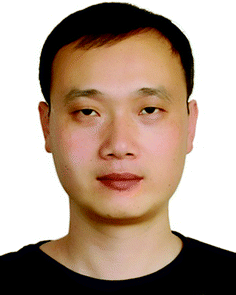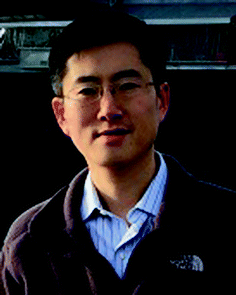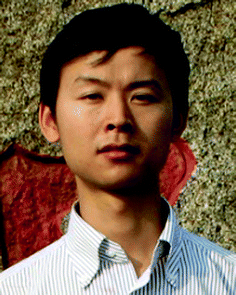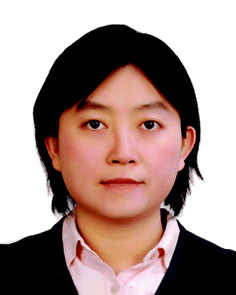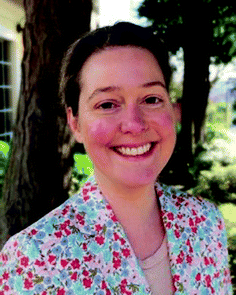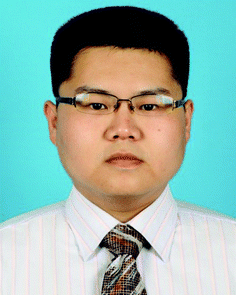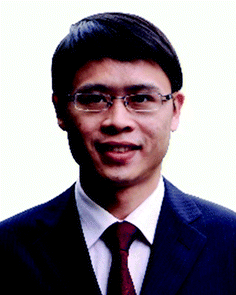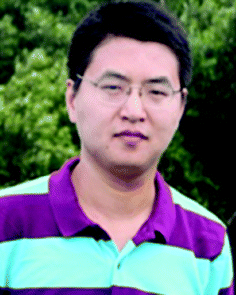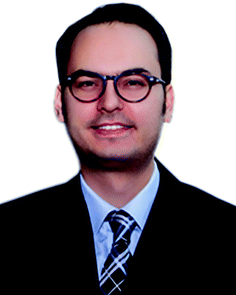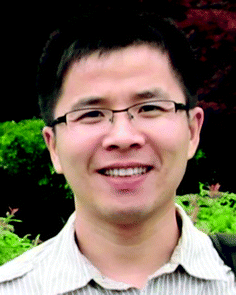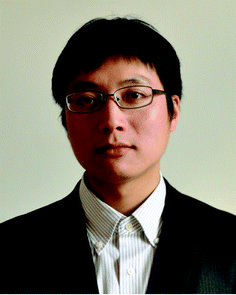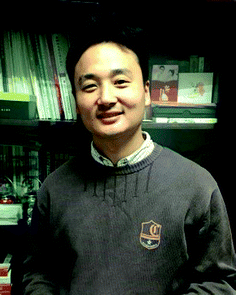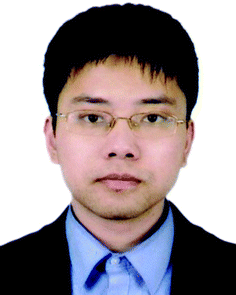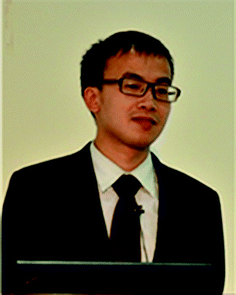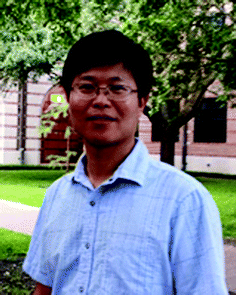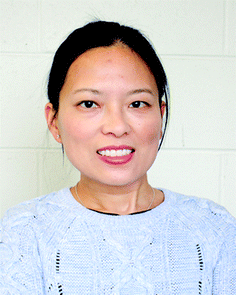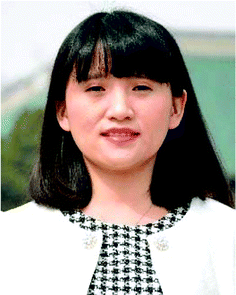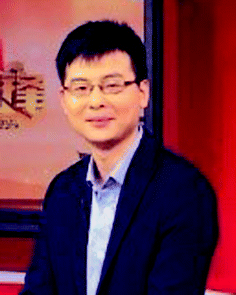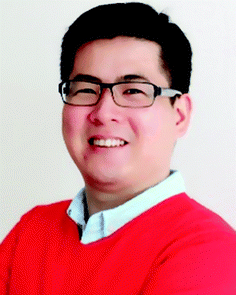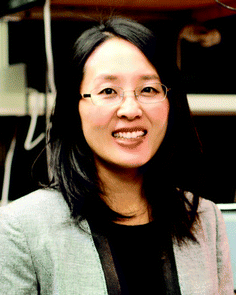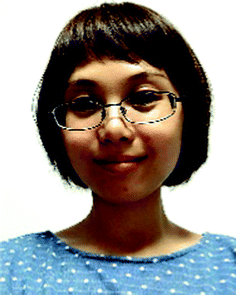Contributors to the 1st Emerging Investigators collection
Abstract
Welcome to the inaugural “Emerging Investigators” themed collection from Materials Chemistry Frontiers! The purpose of this collection is to recognize outstanding chemists working at the front of materials sciences that are in the early stages of their independent careers. Here we introduce to you these up-and-coming scientists and their exciting research.
Yi Cao received his bachelor's degree in 2001 and master's degree in 2004 from Nanjing University. He then obtained his PhD in 2009 from the University of British Columbia. After a one-year postdoc at the same place, he started his independent career at the Department of Physics, Nanjing University as a full professor. He was the recipient of the 2014 IUPAP Young Scientist Prize in Biological Physics for his contributions to the study of nanomechanics and mechanical unfolding dynamics of proteins using single molecule atomic force microscopy. His current research focuses on the application of single molecule methods and molecular engineering to designing biomaterials with tailored mechanical properties.
Read his article: http://dx.doi.org/10.1039/c7qm00402h
Changle Chen obtained his BS degree from the University of Science and Technology of China in 2005. After receiving his PhD from the University of Chicago in 2010, he moved to Northwestern University to start his postdoctoral studies. After some time at Celanese Corporation, he started his independent career as a professor at USTC in 2013. His current research focuses on development of organometallic complexes and new strategies for olefin polymerization and copolymerization. His notable awards include the Chinese Chemical Society Award for Outstanding Young Chemists, American Chemical Society DIC Young Investigator Award and IUPAC Prizes-Honorable Mention.
Read his article: http://dx.doi.org/10.1039/c7qm00321h
Long Chen completed his bachelor's degree at Shanghai University (2003) and master's degree at Shanghai Jiao Tong University with Prof. Wanbin Zhang (2006). Afterwards, he received his PhD in 2009 under the supervision of Prof. Donglin Jiang at the Institute for Molecular Science (IMS, Japan). He then joined Prof. Klaus Müllen's group at Max Planck Institute for Polymer Research (MPIP, Germany) as an Alexander von Humboldt research fellow (2010–2012) and was later appointed as a project leader in the same group (2012–2014). Currently he is a faculty member at Tianjin University. His research focuses on the synthesis and self-organization of functional π-conjugated molecules, conjugated porous polymers for catalysis and energy conversion.
Read his article: http://dx.doi.org/10.1039/c7qm00361g
Yulan Chen graduated from Jilin University in 2005, and obtained her PhD degree from the Institute of Chemistry, Chinese Academy of Sciences (ICCAS), in 2010. During 2010–2014, she worked as a postdoctoral researcher at the Eindhoven University of Technology and the Max Planck Institute for Polymer Research. In September 2014, she was appointed as a professor at Tianjin University. Her current research interests include functional conjugated polymers and mechano-responsive polymers.
Read her article: http://dx.doi.org/10.1039/c7qm00379j
Brandi Cossairt received her BS in Chemistry from the California Institute of Technology in 2006 as a first-generation college graduate. Brandi went on to receive her PhD in 2010 from the Massachusetts Institute of Technology under the guidance of Professor Christopher Cummins. She then continued her academic training as an NIH NRSA Postdoctoral Fellow at Columbia University in the laboratory of Professor Jonathan Owen. Brandi joined the Department of Chemistry at the University of Washington as an Assistant Professor in 2012. She has received a number of awards for her research including a Packard Fellowship, a Sloan Research Fellowship, and an NSF CAREER Award. Brandi is the co-founder of the Chemistry Women Mentorship Network (ChemWMN).
Read her article: http://dx.doi.org/10.1039/c8qm00056e
Wei Guo is a professor at the Technical Institute of Physics and Chemistry, Chinese Academy of Sciences (TIPCCAS). He received his PhD in Physics from Peking University in 2009. Afterwards, he started his scientific career in the Institute of Chemistry CAS as an assistant professor and was further promoted to associate professor. In 2014, he and his group moved to TIPCCAS and he was promoted to full professor in 2015. He has been devoted to nanopore-related research for more than 12 years. His research interests focus on nature-inspired functional materials for energy and environmental applications and novel transport phenomena in nanofluidics.
Read his article: http://dx.doi.org/10.1039/c8qm00031j
Timothy Kelly is an Associate Professor in the Department of Chemistry at the University of Saskatchewan, and holds a Tier 2 Canada Research Chair in Photovoltaics. He received his BSc degree in Chemistry from Memorial University of Newfoundland in 2005, and completed a PhD under the supervision of Prof. Michael Wolf at the University of British Columbia (2005–2009). From 2009–2011 he was an NSERC Post-doctoral Fellow in the laboratory of Prof. Michael Sailor at the University of California, San Diego. His research interests include perovskite solar cells, hard X-ray scattering techniques, organic electronics, and plasmonics.
Read his article: http://dx.doi.org/10.1039/c7qm00396j
Hanying Li is the Qiushi Distinguished Professor in the Department of Polymer Science and Engineering at Zhejiang University, China. In Dec. 2009, he completed his PhD degree at Cornell University in the field of materials science and engineering (advisor: Prof. Lara A. Estroff). After postdoctoral work on organic electronics at Stanford University (Prof. Zhenan Bao's group), Hanying Li moved to Zhejiang University in Dec. 2011. His current research focuses on bio-inspired single-crystal growth and organic-single-crystal-based electronic and optoelectronic devices such as transistors and solar cells.
Read his article: http://dx.doi.org/10.1039/c7qm00509a
Kun Lu has been a professor at the National Center for Nanoscience and Technology (NCNST) since 2015. He obtained his PhD degree from the Institute of Chemistry, Chinese Academy of Sciences (CAS) in 2010. His research focuses on the synthesis of polymeric and small molecular semiconducting materials for photovoltaic devices and their application in large area flexible devices. Based on the above studies, he has published 60 papers with more than 1000 citations. He was awarded the Chinese Chemical Society Award for Outstanding Young Chemists (2016).
Read his article: http://dx.doi.org/10.1039/c7qm00397h
Sedat Nizamoglu received his PhD in Electrical and Electronics Engineering in 2011 at Bilkent University, Turkey. Immediately after graduation, he continued as a research fellow with a joint affiliation with Harvard Medical School and Wellman Center for Photomedicine, Massachusetts General Hospital in USA. Currently he is a faculty member at Koç University, Turkey. His research focuses on the demonstration of innovative devices and interfaces for the applications to energy, medicine, and the environment. He has published more than 40 research papers in prestigious journals. Recently he was recognized by MIT Technology Review as an Innovator Under 35 Turkey, he received the Outstanding Young Scientist Award from the Turkish Academy of Sciences, and he was awarded an ERC (European Research Council) Starting Grant.
Read his article: http://dx.doi.org/10.1039/c7qm00281e
Pengju Pan obtained his bachelor's degree from Zhengzhou University in 2002 and master's degree from Zhejiang University in 2005. He received his PhD from the Tokyo Institute of Technology in 2009. He then joined the Bioengineering Laboratory of RIKEN (Japan) as a postdoctoral researcher (2009–2011). He started his independent career at Zhejiang University in 2011. He has received the Chinese Government Award for Outstanding Self-Financed Students Abroad and the National Science Fund for Excellent Young Scholars, China. His research interests are the condensed and soft matter structures of polymers, with a focus on polymer crystallization, hierarchically assembled structures and the properties of crystallizable polymers.
Read his article: http://dx.doi.org/10.1039/c7qm00502d
Feng Wang got his bachelor's degree from Hefei University of Technology in 2003. He then received his PhD in Chemistry from Zhejiang University under the supervision of Prof. Feihe Huang in 2009. He joined Prof. E. W. Meijer's group at Eindhoven University of Technology as a postdoctoral fellow. He joined the University of Science and Technology of China as an associate professor in 2011, and was promoted to full professor in 2016. His current research interests are focused on transition metal-based supramolecular assemblies for biomedical, optoelectronic, and catalytic applications.
Read his article: http://dx.doi.org/10.1039/c7qm00424a
Yapei Wang is a full professor at Department of Chemistry in Renmin University of China. He received his BS degree from Jilin University in 2004 and PhD from Tsinghua University under the supervision of Prof. Xi Zhang in 2009, both in Chemistry. After graduation, he spent two years as a postdoctoral fellow in Prof. Joseph M. DeSimone's Lab at University of North Carolina at Chapel Hill. In 2012, he joined Department of Chemistry in Renmin University of China. His research interests are mainly focused on photothermal conversion materials and their clinical applications.
Read his article: http://dx.doi.org/10.1039/c7qm00275k
Cheng Wang is now a professor of Chemistry at Xiamen University, China. He received his BSc in chemistry at Peking University, and PhD in inorganic chemistry at University of North Carolina at Chapel Hill in US. He worked with Professor Wenbin Lin on metal–organic frameworks for heterogeneous catalysis for his doctoral thesis. He then went to the University of Chicago as a postdoc to study photodynamics in photocatalysis using ultrafast spectroscopy. Dr Cheng Wang got the Young Investigator Award from Division of Inorganic Chemistry, American Chemical Society in 2013, and the Junior Thousand Talents Award of P. R. China in 2015. Currently Dr Cheng Wang's research focuses on metal–organic layers as solid state catalysts. His interest covers conversions of C1 molecules
via solid–gas phase catalysis, electrocatalysis and photocatalysis.
Read his article: http://dx.doi.org/10.1039/c7qm00328e
Yuen Wu received his BS and PhD degrees from the Department of Chemistry, Tsinghua University in 2009 and 2014, respectively. He is currently a professor in the Department of Chemistry, University of Science and Technology of China. His research interests are focused on the synthesis, assembly, characterization and application exploration of functional nanomaterials.
Read his article: http://dx.doi.org/10.1039/c8qm00095f
Shubin Yang is a Professor at the School of Materials Science and Engineering, Beihang University. He received his PhD from Beijing University of Chemical Technology in 2008 after carrying out studies on high-performance lithium ion batteries under the guidance of Prof. Huaihe Song. He then pursued postdoctoral studies with Prof. K. Muellen and P. M. Ajayan at Max Planck Institute for Polymer Research and Rice University, respectively. His current research interests involve graphene, MXenes and other two-dimensional materials for energy storage and conversions.
Read his article: http://dx.doi.org/10.1039/c7qm00548b
Yan Yu is currently an Assistant Professor in the Department of Chemistry at Indiana University Bloomington. She received her PhD in Materials Science and Engineering at the University of Illinois at Urbana–Champaign in 2009 and completed postdoctoral training at University of California, Berkeley in 2012. Prof. Yan Yu's group is working on developing nanomaterial-enabled tools to measure and control cellular functions.
Read her article: http://dx.doi.org/10.1039/c7qm00521k
Quan Yuan received her BS degree (2004) from Wuhan University and her PhD (2009) in Inorganic Chemistry from Peking University. Afterwards, she performed postdoctoral research on DNA-functionalized nanomaterials with Prof. Weihong Tan at the University of Florida. In 2012, she joined the College of Chemistry and Molecular Sciences, Wuhan University. Her research interests include the design of functional nanomaterials and investigating their corresponding biomedical applications.
Read her article: http://dx.doi.org/10.1039/c7qm00434f
Guoqing Zhang is currently a full professor at the Hefei National Laboratory for Physical Sciences at the Microscale at the University of Science and Technology of China (USTC), where he received his degree in Bachelor of Science. Prof. Zhang received his PhD degree in Chemistry at the University of Virginia under the supervision of Prof. Cassandra L. Fraser and his research was mostly on the sensing and imaging applications of difluoroboron diketone polylactides. He then proceeded to Harvard to work with Prof. X. Sunny Xie on transposon study in understanding bacterial persistence. In the summer of 2011, Prof. Zhang joined the faculty of USTC where he started to work on the design and synthesis of new phosphorescent materials. His primary research interests now include: (1) fluorogenic dyes for assisted surgical procedures, (2) development of methods to achieve highly efficient phosphorescence based on purely organic systems, and (3) the design and synthesis of new antimicrobial polypeptide mimics (APMs). In 2015, Prof. Zhang founded a startup company dedicated to consumer products based on APMs and has successfully raised more than $3 million in venture capitals. In 2016, Prof. Zhang led a team of scientists and artists to win the First Place in National Women's Fashion Design Competition of China based on a class of fractal structures observed during lab research.
Read his article: http://dx.doi.org/10.1039/c7qm00399d
Yue-Biao Zhang obtained his PhD degree in 2011 from Sun Yat-Sen University at Guangzhou under the supervision of Prof. Xiao-Ming Chen. He was a postdoc researcher in the Yaghi lab at UCLA, LBNL and UC Berkeley from 2011 to 2015. He is now an Assistant Professor at the School of Physical Science & Technology, ShanghaiTech University. He is awarded by the “1000 Young Talent Program”. His research interests include the discovery of metal–organic frameworks and design of covalent organic frameworks for gas storage and separation.
Read his article: http://dx.doi.org/10.1039/c7qm00414a
Jing Zhao obtained her PhD from Northwestern University in 2008, under the supervision of Prof. Richard Van Duyne and Prof. George Schatz. She then joined Moungi Bawendi's lab at Massachusetts Institute of Technology as a postdoctoral researcher. She has been an assistant professor in the Chemistry Department at University of Connecticut since 2012. She is also a member of the Institute of Materials Science at UConn. Her research interest includes the synthesis of metal and semiconductor nanocrystals, optical spectroscopy, single particle spectroscopy, photocatalysis, biological sensing and imaging.
Read her article: http://dx.doi.org/10.1039/c7qm00538e
Wei Zhou received her PhD degree in Materials Science and Engineering from Beihang University under the supervision of Prof. Lin Guo in 2009. She worked as a visiting scholar in Prof. Hong Yang's group in University of Illinois at Urbana–Champaign (UIUC) in 2012–2013. Currently, she is a professor at School of Chemistry in Beihang University. Her research interests focus on iron triad (Fe, Co, Ni) and their compounds’ nanomaterials for applications in energy, adsorption and catalysis.
Read her article: http://dx.doi.org/10.1039/c7qm00533d
|
| This journal is © the Partner Organisations 2018 |

